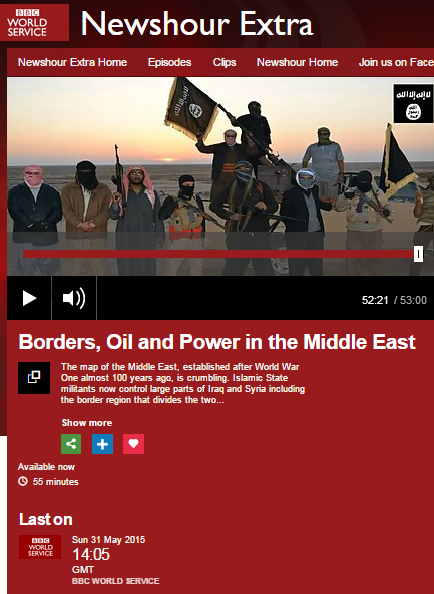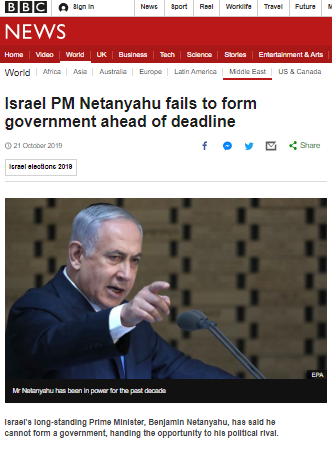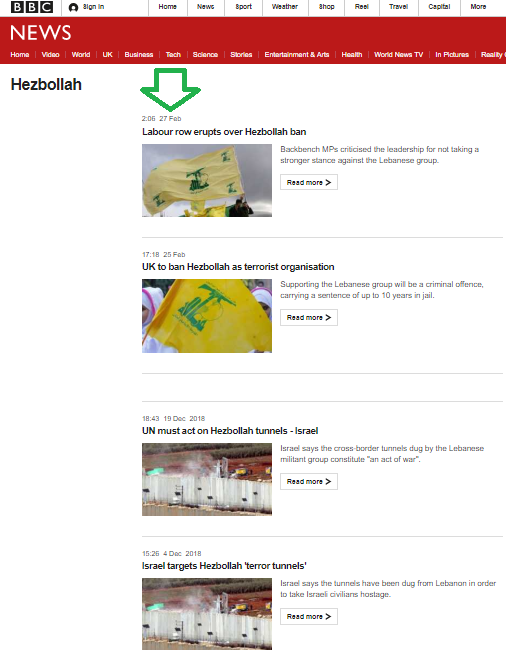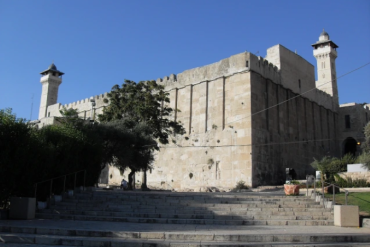Visitors to the BBC News website’s Middle East page on June 1st were presented with an article in its features section by Owen Bennett-Jones titled “Middle East map carved up by caliphates, enclaves and fiefdoms“. There, they found the reasons for the past four or so years of violence and turmoil in the Middle East and North Africa explained as follows:
“There are many explanations for the winds of change sweeping through the Middle East.
Depending on their point of view, analysts cite the failure of Arab nationalism; a lack of democratic development; post-colonialism; Zionism; Western trade protectionism; corruption; low education standards; and the global revival of radical Islamism.” [emphasis added]
Readers who ventured to the end of Bennett-Jones’ piece discovered that it is based on an edition of the BBC World Service radio programme ‘Newshour Extra’ – titled “Borders, Oil and Power in the Middle East” – which he hosted on May 31st. What they are not told in the written article is that the main reason for the bizarre appearance of Zionism on his list of “explanations” for the ongoing violence in the Middle East is the inclusion of Oxford University’s Avi Shlaim on Bennett-Jones’ guest list for that programme.
According to its synopsis the fifty-five minute programme supposedly set out to discuss the following topics:
“The map of the Middle East, established after World War One almost 100 years ago, is crumbling. Islamic State militants now control large parts of Iraq and Syria including the border region that divides the two countries, and their territorial ambitions have not ended there. Is Islamic State permanently re-drawing the map, or can the traditional regional powers retain their dominance? What are the consequences for the people who live within those borders and for control of the region’s vast mineral wealth?”
Those familiar with Avi Shlaim’s political activism (albeit often thinly disguised with an academic veneer) will not have been surprised by his ability to repeatedly bring the focus of the programme back to his pet topic of Israel. Listeners may have been equally unsurprised to find that the programme’s host and editors indulged his hobby, particularly after the tone was set in Bennett-Jones’ introduction.
“…this week looking at the future of the Middle East. Syria, Yemen, Libya and parts of Iraq are in violent chaos. The status of Gaza and the West Bank remain contested. The Arab Spring has failed. Some of its leaders face the death penalty and the forces in the ascendant: theocrats, rebels, nationalists, gangsters, arms dealers and opportunists. What on earth is going to happen?”
From around 04:30 listeners heard the following supposedly objective and academic account of the background to the topic under discussion from Avi Shlaim.
“…Britain’s behavior during the First World War is a prime example of pure opportunism because in the course of fighting the First World War, Britain was desperate to gain allies and it made three major promises that were contradictory and couldn’t be reconciled and this should have been clear during the war. The first promise was to Hussein the Sharif of Mecca – to support an independent Arab kingdom under his rule in return for mounting an Arab revolt against the Ottoman Turks. The second promise […] is the Sykes-Picot Agreement of 1916. This was a secret agreement between Britain and France to carve up the Middle East between themselves at the expense of the Arabs. And the third and most famous promise was the Balfour Declaration of 1917 in which Britain undertook to support the establishment of a national home for the Jewish people in Palestine. So Palestine was the twice-promised land – first it was promised to Hussein the Sharif of Mecca and then it was promised to the Zionists. And after the end of the war the chickens came home to roost. The Arabs demanded an independent Arab kingdom – not a system of mandates – and the Zionists, who at the time of the Balfour Declaration were only 10% of the population, laid a claim to the whole of Palestine. So Britain – through its imperialist diplomacy – created a new order, a new political system – territorial system – which lacked legitimacy. The borders lacked legitimacy, the rulers who were imposed on the local Arabs by the colonial powers lacked legitimacy. So the whole mark of the post-World War One territorial and political system was that it was illegitimate….” [emphasis added]
No attempt was made by Owen Bennett-Jones to balance Shlaim’s predictably selective presentation of events by mention of all-important additional factors such as the creation in 1921 of the Emirate of Transjordan (ruled by one of Hussein’s sons) out of land previously designated for the Jewish National Home. Neither was it clarified to listeners that no mention was made of Palestine in the Hussein-McMahon correspondence or that as was reported in The Times in 1937 – Sir Henry McMahon later clarified:
“I feel my duty to state, and I do so definitely and emphatically, that it was not intended by me in giving this pledge to King Hussein to include Palestine in the area in which Arab independence was promised. I also had every reason to believe at the time that the fact that Palestine was not included in my pledge was well understood by King Hussein.”
The most striking aspect of Bennett-Jones’ failure to relieve listeners of the misleading impressions provided by Shlaim, however, is that the BBC had every reason to be capable of anticipating exactly how he was going to frame the issue because he had done it before on BBC Radio 4 in October 2013. No less interesting is the fact that despite Shlaim’s obvious and repeatedly expressed enthusiasm for Kurdish independence as promised in 1920, Bennett-Jones refrained from asking him why in his opinion the Treaty of Sèvres should be considered any less “illegitimate” than the Balfour Declaration or the Sykes-Picot Agreement.
From around 16:35 listeners were further misled by the following statement from Shlaim:
“It seems to me that the post-World War One territorial order, for all its shortcomings and limitations that I talked about before, had one merit and that is it set out very clear international borders and despite all the turmoil of the last century, all the violence, all the conflicts, these borders still stand – with one exception: the border between Israel and Palestine. But all the other borders are almost sacrosanct.”
Of course it is inaccurate and misleading to suggest that a “border between Israel and Palestine” existed under “the post-World War One territorial order”.
Towards the end of the programme (at around 41:30), Bennett-Jones informs listeners that the discussion will “look ahead to what’s going to happen to various groups in the Middle East”. If listeners thought that they were finally going to get to hear some information about the situation of Christians, Yezidis, Druze, Armenians, Baha’is or any of the many other Middle East minorities unmentioned so far, they would have been disappointed. Instead, a full five minutes is spent discussing the topic introduced by Bennett-Jones at the start of that segment.
OBJ: “…on the Israeli-Palestinian dispute; is it right to say that when we talk about borders changing – Professor Shlaim made the point that the Israel-Palestine situation is one of the few fluid situations in terms of borders – but does it connect with the rest of the Middle East or is that dispute….”
At that point Bennett-Jones is cut off – apparently by some over-enthusiastic editing – but listeners do hear BBC regular Rosemary Hollis telling them that:
“…having a number of Palestinian scholarship students as I do, they see this chaos in Iraq and Syria and this hideous machine called IS as potentially the only game changer that might ultimately call all the borders into question in a way that might benefit the Palestinians. Otherwise they see their future as miserable and they see Gaza as a place where you die slowly and, as of 2020 when life is unsustainable in Gaza according to the UN, you die more quickly – if there’s not another Israeli-Palestinian war in the meanwhile.”
According to the CIA World Factbook, life expectancy in the Gaza Strip in 2014 was 74.64 years – higher than that in one hundred and thirteen other countries or territories and higher than that for males in Blackpool or Glasgow, which BBC audiences would of course be unlikely to hear described as places “where you die slowly”.
Following that (from around 45:25), listeners hear Avi Shlaim telling them that there will be no peace or stability in the Middle East until Jews lose their right to self-determination.
“To answer your regional question, I don’t think that Israel-Palestine is a separate discrete conflict. It’s part of the whole Middle East set-up and it’s the most fundamental and lasting and enduring conflict in the region and there can be no peace, no stability and no security in the Middle East until the Israeli-Palestinian conflict is resolved. How can it be resolved? I used to be a great supporter of the two state solution but […] it is no longer viable. Why is it not viable? Because Israel, under right-wing governments, has systematically destroyed the basis for a two state solution. And therefore today I support and advocate a one state solution: one state which is for all its citizens with equal rights for all its citizens be they Arab or Israeli, Muslim, Christian or Jewish.”
No attempt is made by the programme’s host to inform listeners of the significance and consequences of the ‘solution’ to all the Middle East’s troubles as put forward by Shlaim and likewise no effort is made to relieve them of the ridiculous notion that ISIS jihadists are slaughtering Yezidis, Kurds and Christians (among others) and Bashar al Assad is killing his own people because the Arab-Israeli conflict has yet to be resolved.
Amazingly, this is what passes for objective, impartial, factual and accurate analysis of the Middle East as far as the BBC World Service is concerned, but Avi Shlaim’s historical misrepresentations had not finished there – as we shall see in part two of this post.




